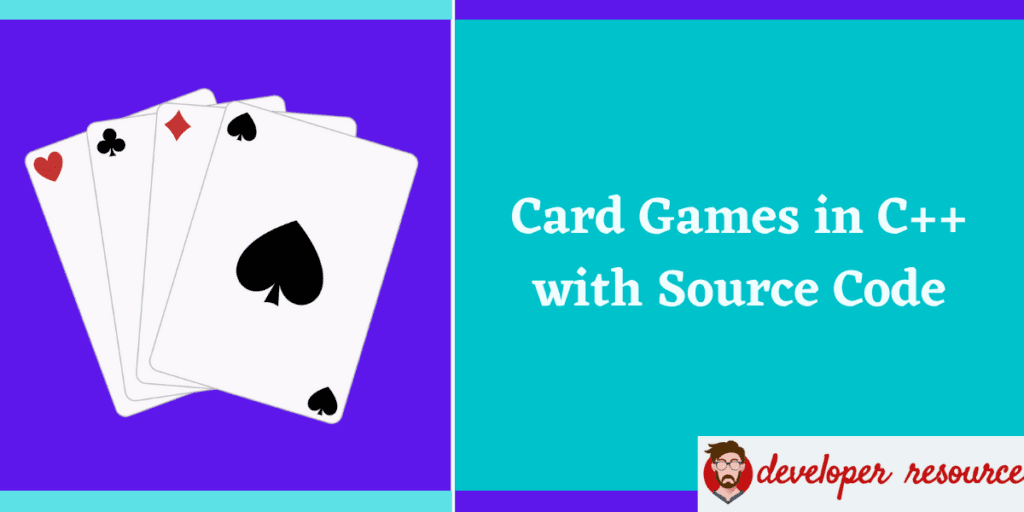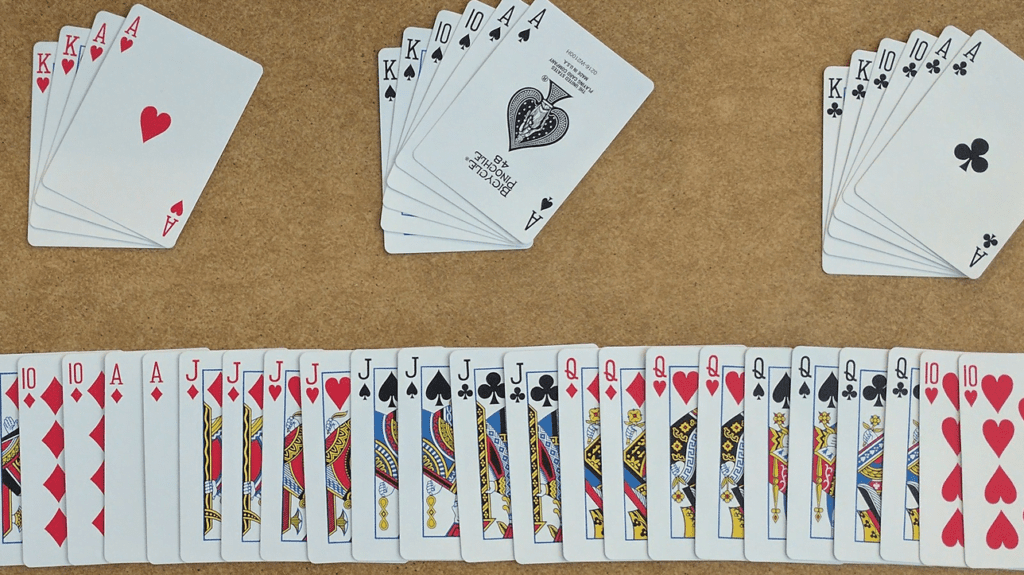Table of Contents
C++ operates close to the hardware, manipulates resources easily, eliminates CPU-intensive functions, and is fast. Moreover, it is able to handle the complexity of 3D games and offers Multilayer networking.
Have you ever wondered how game development works in C++? Do you have a coding project or class assessment that involves writing an arcade game in C++?
A basic card game always consists of a deck of 52 cards. Each card consists of a face and a back. All the cards are of identical shapes and sizes. The front is distinguishable by spades, ace, diamond, and heart shapes on it. But the back of all the cards is the same; hence they are indistinguishable. The deck of 52 cards contains 4 suites of 13 cards. The cards are only recognizable from one side, so each participant only knows about the card he is holding.
Card Games in C++ source codes
Several card games are developed in C++. So now, coming over our primary concern, you will learn about some main Card Games in C++ with Source Codes.
1. Trick-taking game; Hearts

Hearts is one of the trick-taking games in which each participant aims to avoid winning the round or tricks that consist of hearts. Queen of the spades is also the focal point to be avoided. The heart game consists of 4 players.
Three of the players that are player one, player two, and player three are automated by the computer, and the fourth player is the human or the user. The declaration of the game is made after the player with the least points is recognized. Therefore, the player scoring the lowest points is the winner of the game, and the game is over.
Points allocation
The point allocation is as follows:
- 5 points are for cards with a face value of less than 10.
- 10 points are for the rest of the heart cards.
- 100 points are for the queen of spades and club of the jack.
Technique to play
- Each player has to deal with thirteen cards when the game begins.
- The person holding two of the clubs leads to the first trick.
- The leading suite is the suite in which the first card is played on each hand.
- The rest of the 3 participants should play each of the cards of the same suite if he has one.
- The player has to play a card of another suite if he does not have one from the same suite.
- Players with the leading cards having the highest value will collect the points.
- The program starts by representing the user’s card when the game begins.
- In each round, the cards of each player are shown.
Example on Github: Source Code 1 / Source Code 2 / Source Code 3
2. Solitaire

Solitaire is one of the games in C++ which have more than 1050 of its versions. It is one of the single-player games that begins with a tableau that is a special card layout.
The user’s objective is to construct the final layout of the cards. From classic games to original games, you can search anywhere on the internet for solitaire games.
This game consists of a deck of 52 cards like every other card game. Each version of the game includes these cards in a different order, so the user can shift to another if he gets bored with one solitaire game. You can also set the mode of each version of the game according to your will.
MODES
- Easy
In the easy version, the user can accomplish the task within the least time as the game’s complexity decreases. This version of the game is mainly for beginners to start with so they can gradually improve their skills and move to higher levels.
- Moderate
The moderate level is somewhat tricky as there are some skills needed to accomplish the game within the least amount of time so you can make records.
- Complex
The complex mode of this game requires some excellent skills so you can understand and predict your next move in a way that your cards are arranged in a sequence, and you can win the game in little time.
Moreover, you need to have a brilliant understanding of the game to reach this mode.
/* Source: http://www.cplusplus.com/forum/general/87952/ */
#include <iostream>
#include <stdio.h>
#include <stdlib.h>
#include <conio.h>
#include <ctime>
#include <windows.h>
using namespace std;
struct Card {
char *face;
char *pix;
char *suit;
};
typedef struct Card card;
void fillDeck(card *, char *[], char *[], char *[]);
void shuffle(card *, int);
void deal(card *);
void WaitKey();
int main()
{
int shuffled = 1250;
card deck[52];
char *face[] = {"Ace","Duece","Three","Four","Five","Six","Seven","Eight","Nine","Ten","Jack","Queen","King"};
char *pix[] = {"\x03","\x05","\x04","\x06"}; // - Added to original program
char *suit[] = {"Hearts","Clubs","Diamonds","Spades"};
time_t t;
srand((unsigned) time(&t)); // Randomize using time
cout << "\n\t\t*** A deck of cards after " << shuffled << " shuffles ***\n\n";
fillDeck(deck, face, suit, pix);
shuffle(deck, shuffled);
deal(deck);
printf("\n\n\t");
WaitKey();
return 0;
}
void fillDeck(card *wDeck, char *wFace[], char *wSuit[], char *wPix[])
{
int i;
for (i = 0; i < 52; i++)
{
wDeck[i].face = wFace[i % 13];
wDeck[i].pix = wPix[i / 13]; // Added
wDeck[i].suit = wSuit[i / 13];
}
}
void shuffle(card *wDeck, int shuffled)
{
int i, j, x;
Card temp;
for (x = 0; x < shuffled ; x++) // A big shuffle
{
for (i = 0; i < 52; i++)
{
j=rand() % 52;
temp = wDeck[i];
wDeck[i] = wDeck[j];
wDeck[j] = temp;
}
}
}
void deal(card *wDeck)
{
int i;
for (i = 0; i < 51; i++)
{
if ( wDeck[i].pix == "\x03"||wDeck[i].pix== "\x04" )
SetConsoleTextAttribute (GetStdHandle(STD_OUTPUT_HANDLE), 4);
else
SetConsoleTextAttribute (GetStdHandle(STD_OUTPUT_HANDLE), 8);
printf(" %5s of %-8s (%s) %c", wDeck[i].face, wDeck[i].suit, wDeck[i].pix, (i + 1) % 3 ? '\b' : '\n');
}
if ( wDeck[51].pix == "\x03"||wDeck[51].pix== "\x04" )
SetConsoleTextAttribute (GetStdHandle(STD_OUTPUT_HANDLE), 4);
else
SetConsoleTextAttribute (GetStdHandle(STD_OUTPUT_HANDLE), 8);
printf("\t\t\t %5s of %-8s (%s) \n", wDeck[51].face, wDeck[51].suit, wDeck[51].pix);
}
void WaitKey()
{
SetConsoleTextAttribute (GetStdHandle(STD_OUTPUT_HANDLE), 8);
cout << "\t\t Press ENTER to continue...\n\t\t";
while (_kbhit()) _getch(); // Empty the input buffer
_getch(); // Wait for a key
while (_kbhit()) _getch(); // Empty the input buffer (some keys sends two messages)
}Versions of classic Solitaire
- FreeCell
It is one of the most common solitaire games. Only a few of the deals in the games are unsolvable. All the cards are dealt face-up from the start of the game. The cards in each game are shuffled randomly by the computer.
There are four open cells and four open foundations. All cards should be moved to the foundation cells in a sequence to win the game. The player can move the complete or partial tableaus to arrange the cards.
Example on Github: Source Code 1 / Source Code 2 / Source Code 3
- Spider
The Spider solitaire game was developed in 1949, and the idea for the game’s name was taken from a spider. The 8 legs of a spider refer to the 8 foundation piles to be filled in an order and sequence to win the game.
The cards are arranged from a bigger value card that is king to the smallest card that is one. If you need inspiration for your source code, check out an online Spider Solitaire game. Play a sample game on the website and then try to recreate different moves with C++.
Example on Github: Source Code 1 / Source Code 2 / Source Code 3
- Fishing Card games
In fishing card games, the user has to match the card from their hand to the one present on the table in each turn. If he cannot match any card, it stays on the table. One of the fishing card games in C++ is as follows.
Example on Github: Source Code 1 / Source Code 2 / Source Code 3
3. Go Fish Game

Go fish game in C++ uses a standard deck of 52 cards that are randomly shuffled. Every card on the deck is labeled with a suit and a rank.
Every player has to deal with the hand of seven cards, and only the player dealing with the cards can see the cards. The remaining cards are stocked aside, and they are faced down.
Player 1 starts the game as he asks player 2 for his cards. The player should have had a single card of the same rank as player B. The game continues by alternating turns. The players with the most match cards will win the game.
Example on Github: Source Code 1 / Source Code 2 / Source Code 3 – Some help with C++ source code
So that’s all for now. I hope this article will enhance your knowledge about card games in C++, and you can furtherly create these games on your own.
If you want to suggest an addition to this article, you are welcome to share it in the comments section. I will be waiting for your feedback.
